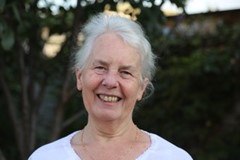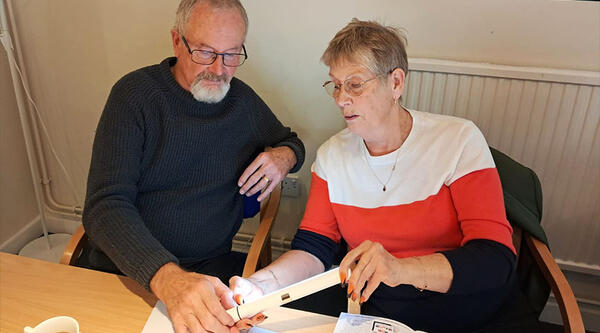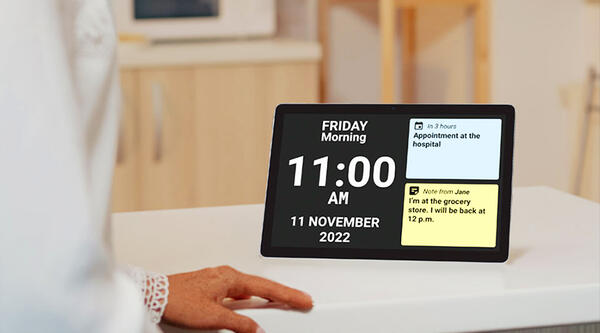Longitude Prize on Dementia offers new hope in helping people with dementia stay independent
Alzheimer’s Society, Innovate UK and Challenge Works are calling for innovators around the world to use artificial intelligence to create breakthrough technologies that learn from a person living with dementia.
Alzheimer’s Society, Innovate UK and Challenge Works are today launching a new £4.34 million Longitude Prize on Dementia.
It is calling for innovators around the world to use artificial intelligence to create breakthrough technologies that learn from a person living with dementia.
The technologies should adapt and compensate for their condition as it progresses and help people living with the disease maintain their independence and lead a fulfilling life doing things they enjoy.
Benefits of using technology
In a new survey released today of people with close family and friends living with dementia, 54% said that they would be less concerned about their relative’s safety if they had the technology to help them live independently.
6 in 10 people believe that technology will become even more important in the future for managing dementia.
Peter's story
Peter Harris, 58, a former oil rig worker from Cleethorpes, has lived with vascular dementia for five years. His family has helped him adapt some existing technologies to his needs.
'I’d forget to take my daily medication if it wasn’t for my smart speaker alerts, and I’d leave the oven on after cooking if one of my sons hadn’t programmed the speaker to remind me.
'In my old flat, I had a hob that I would leave on and once a tea towel caught on fire, but luckily I was able to get it in the sink. Thankfully there was no damage done but of course my children were really worried, and one of my sons decided to get me the smart speaker so it wouldn’t happen again. Now both my sons and my daughter have peace of mind.
The number one priority for me is to keep safe and happy at home.
'I don’t want to give up my independence and I am excited by any technology that could help me stay at home for longer. I’m grateful my son can help me, but I know not everyone has that support.
'My dementia means I struggle to follow instructions, and often don’t even know where to start, so it’s important that technology is designed with people like me in mind.'
Tackling a global challenge
There are 50 million people living with dementia globally, with around 900,000 in the UK – and it is set to rise dramatically. The condition devastates lives, causing people to lose memories, relationships and their identity, and could affect as many as 153 million by 2050.
Although there is currently no cure for dementia, people with the condition can live well for years.
Hospital admissions have been proven to increase the rate of decline, but the hope is that assistive technology can help people stay safe and independent in their home for longer.
A previous survey by Alzheimer’s Society (Fix Dementia Care: Homecare) revealed 85% of people said they would want to stay at home for as long as possible if diagnosed with dementia.
Untapped possibilities with technology
From today, global innovators are invited to develop technologies that learn about the routines of people living with early-stage dementia, employing artificial intelligence and machine learning to adapt as their condition progresses, bridging the cognitive gaps that develop with the disease. There are huge possibilities for dementia that are currently largely untapped.
The latest survey of people with friends and family living with the disease reveals that although some reported that loved ones benefitted from existing technology including monitoring devices (20%), GPS tracking devices (16%), and phone reminders (14%), over a quarter of people said their relatives didn’t use technology at all (26%).
Jennifer's story
Jennifer Bute, 77 is a retired GP living in a dementia-inclusive village in Cheltenham and was diagnosed with dementia in 2009.

'I already use lots of devices to remember things, such as an app for banking or my iCalendar on my computer which can read out reminders and events.
'I use Zoom a lot too to speak to family and friends. During the pandemic, I worked with staff to help other residents living with dementia to set up Zoom so that they could attend activities, so I know there are lots of people who would love to use technology to help them communicate.'
But there are barriers as technology isn’t always dementia-friendly – it needs to be simple!
Huge opportunities for people living with dementia
Announcing the launch of the prize, Kate Lee, Alzheimer’s Society’s Chief Executive said:
'The survey showed that many felt technology, like facial recognition, could help them communicate when speech declines, but would not be available in their loved ones’ lifetime. However, amazingly it already exists in the apps and smart technology we use every day.
'We could repurpose the software of TikTok and WhatsApp to help people put a name to a face or remember a word.
'The new Longitude Prize on Dementia will open up huge possibilities in this area, making technology work for people living with dementia and their families.'
First prize of £1 million
Delivered by challenge prize experts, Challenge Works, the £4.34m Longitude Prize on Dementia will award £3.34 million in seed funding and grants to the most promising innovators, with a £1 million prize awarded to the winner in early 2026.
In addition, wider support has been funded to provide innovators with crucial insight and expertise – such as access to data, collaborations with people living with dementia and expert advice on product design and business aspects of the innovation.
George MacGinnis, Challenge Director for Healthy Ageing at Innovate UK said:
'This global prize is calling on world-class innovators to transform the lives of people living with dementia.
'Innovate UK, in our role as the UK’s innovation agency, is pleased to be supporting global innovators to create breakthrough products and services that can support independent living for people with the early stages of dementia, help them to live enjoyable and fulfilling lives, and provide their families with invaluable reassurance.'
Generous support from donors
The prize has received generous support from UK donors The Hunter Foundation, CareTech Foundation and Heather Corrie, as well as the Medical Research Council (MRC).
Jonathan Freeman MBE, CEO, CareTech Foundation, says:
'Dementia is a devastating disease that robs individuals of their identity, and it’s becoming a rising concern for the ageing population. For the Foundation, this technology will be game-changing and provide critical solutions.
'Our decision to be part of the Longitude Prize on Dementia was a no-brainer and we are excited by the talented innovators it will help to discover in the future.'
Enter the Longitude Prize on Dementia
Entries close on 26 January 2023 at 1200 GMT. Learn more by visiting dementia.longitudeprize.org







